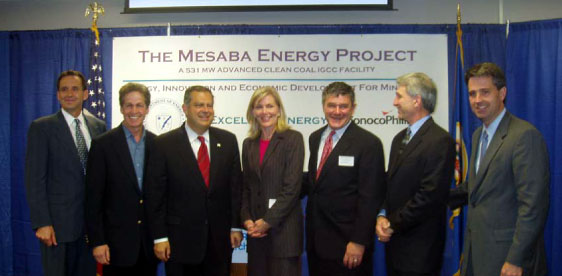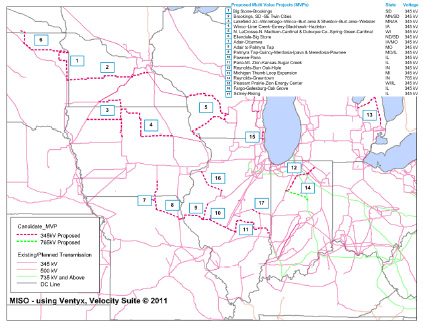Another cut to Excelsior Energy
March 12th, 2013
Dying the death of a thousand cuts, here’s one more paper cut for our good friends at Excelsior Energy.
Excelsior Energy’s Mesaba Project, the creme-de-la-creme of vaporware projects, was slashed again by a Midwest Independent System Operator filing with FERC that the project had breached its transmission interconnection agreement and was in default. MISO has asked FERC to terminate the agreement:
The state has been unreasonably and inexplicably reluctant to kill this non-project. Maybe the feds are willing?
And MISO “approval” means exactly what?
December 9th, 2011
Here it is, MTEP 11, the Midwest Transmission Expansion Plan for 2011 (CLICK HERE, look on lower right), and it’s in the news too. The main report and some appendices:
MTEP 11 Appendix A-1_2_3 – Cost Allocation
Page listing all the Appendices
MTEP Appendix e52 Detailed Proposed MVP Portfolio Business Case
Please take note that this includes not only the CapX 2020 Brookings-Hampton line (#2 on map), but also the LaCrosse-Madison line (#5 on map), the one they need to build or they’ve got a lot of system instability goin’ on.
From my perspective, the most important thing to be aware of is that MTEP 11, and the MTEPs that preceded it, are about the shift to economic dispatch and development of the electric market. At the outset, MISO studied potential benefits of this shift, and found massive economic benefits, of which they speak in their press release. The economic benefits are realized by optimizing use of lower production cost generation, and in their own words, to “displace natural gas with coal.” Don’t believe it? Read this study that ICF did for MISO:
This is the worst possible result for those of us who breathe, and means that tens of thousands of landowners will have very high voltage transmission lines on their land, taken from them by eminent domain. These projects, almost all of the MTEP projects, are not about electric reliability, they’re “need” is to deliver market transactions of electric generation from any “point A” to any “point B,” and this is a private interest, a desire for market profits, and not a public interest.
Another issue looming is “what does MISO ‘approval’ mean?” Transmission lines are regulated by states, individually, and there is a movement to strip states of their regulatory authority and transfer that to federal entities. Look no further than Obama’s transmission “fast track” proposal, naming one of the CapX 2020 projects! States must make their energy regulatory decisions in an open, transparent process and based their decisions on ratepayer and public interest. That focus is not present in federal top-down edicts. States’ rights are at issue and we need to keep on our toes so this power shift doesn’t slide through.
And it’s not “just” the ICF report above, that’s it’s all about coal is clear from prior press. Here’s an important sentence, quoting GRE’s spin-guy Randy Fordice — explaining what we all know, that the MISO effort to get the “benefits” of displacing natural gas with coal:
Coal with benefits, yesiree… Gotta hand it to Fordice for being honest!


